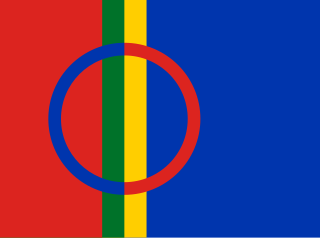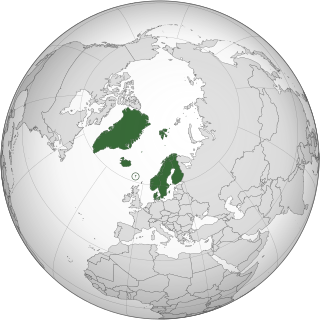
Danish is a North Germanic language spoken by about six million people, principally in and around Denmark. Communities of Danish speakers are also found in Greenland, the Faroe Islands, and the northern German region of Southern Schleswig, where it has minority language status. Minor Danish-speaking communities are also found in Norway, Sweden, the United States, Canada, Brazil, and Argentina.

The Sámi are the traditionally Sámi-speaking people inhabiting the region of Sápmi, which today encompasses large northern parts of Norway, Sweden, Finland, and of the Kola Peninsula in Russia. The region of Sápmi was formerly known as Lapland, and the Sámi have historically been known in English as Lapps or Laplanders, but these terms are regarded as offensive by the Sámi, who prefer the area's name in their own languages, e.g. Northern Sámi Sápmi. Their traditional languages are the Sámi languages, which are classified as a branch of the Uralic language family.

The Nordic Council is the official body for formal inter-parliamentary Nordic cooperation among the Nordic countries. Formed in 1952, it has 87 representatives from Denmark, Finland, Iceland, Norway, and Sweden as well as from the autonomous areas of the Faroe Islands, Greenland, and Åland. The representatives are members of parliament in their respective countries or areas and are elected by those parliaments. The Council holds ordinary sessions each year in October/November and usually one extra session per year with a specific theme. The council's official languages are Danish, Finnish, Icelandic, Norwegian, and Swedish, though it uses only the mutually intelligible Scandinavian languages—Danish, Norwegian, and Swedish—as its working languages. These three comprise the first language of around 80% of the region's population and are learned as a second or foreign language by the remaining 20%.

The Convention on the Elimination of all Forms of Discrimination Against Women (CEDAW) is an international treaty adopted in 1979 by the United Nations General Assembly. Described as an international bill of rights for women, it was instituted on 3 September 1981 and has been ratified by 189 states. Over fifty countries that have ratified the Convention have done so subject to certain declarations, reservations, and objections, including 38 countries who rejected the enforcement article 29, which addresses means of settlement for disputes concerning the interpretation or application of the convention. Australia's declaration noted the limitations on central government power resulting from its federal constitutional system. The United States and Palau have signed, but not ratified the treaty. The Holy See, Iran, Somalia, Sudan, and Tonga are not signatories to CEDAW.
Prostitution in Denmark was partly decriminalised in 1999, based partly on the premise that it was easier to police a legal trade than an illegal one. Third-party activities, such as profiting from brothel administration and other forms of procuring, remain illegal activities in Denmark, as do pimping and prostitution of minors.
Prostitution in Norway is illegal and a criminal act when sexual acts are purchased, but not when sold. The Norwegian law prohibiting the buying of sexual acts came into effect on 1 January 2009, following the passing of new legislation by the Norwegian parliament in November 2008. Soliciting and advertising "sexual services" is also illegal under the Norwegian Criminal Code section 378 and section 202(3).

The Nordic countries are a geographical and cultural region in Northern Europe and the North Atlantic. It includes the sovereign states of Denmark, Finland, Iceland, Norway and Sweden; the autonomous territories of the Faroe Islands and Greenland; and the autonomous region of Åland.

Universitetsforlaget AS, also known in English as Scandinavian University Press, is a Norwegian academic publishing company, which publishes non-fiction literature and journals mainly oriented to Scandinavia. Universitetsforlaget is the largest academic press in Scandinavia, and is a wholly owned independently operated subsidiary of Aschehoug, founded in 1872. Universitetsforlaget was originally the name of an independent publishing company founded by Tønnes Andenæs in 1950, which later merged with other publishing companies to become a subsidiary of Aschehoug in 2000.

The Faculty of Law of the University of Oslo is Norway's oldest law faculty, established in 1811 as one of the four original faculties of The Royal Frederick University. Alongside the law faculties in Copenhagen, Lund and Uppsala, it is one of Scandinavia's leading institutions of legal education and research. The faculty is the highest-ranked institution of legal education in Norway and is responsible for the professional law degree, one of the most competitive programmes at any Norwegian university.
Tidsskrift for Rettsvitenskap is a Norwegian law journal. It was established in 1888 by Francis Hagerup to "form a link between legal research in the Nordic countries" and is currently published by Universitetsforlaget. The journal is one of Scandinavia's preeminent academic journals in the field of law. It is ranked as a Level 2 journal, the highest level in the official Norwegian ranking. Articles are published in the three Scandinavian languages: Danish, Norwegian, and Swedish.
Retfærd, subtitled Nordic Journal of Law and Justice, is a Nordic peer-reviewed academic journal of legal science, publishing research from a "theoretical and practical point of view on the basis of not only jurisprudence, but also sociology, criminology, political science, history, philosophy, economics, ecology, anthropology, feminism and other sciences." Principally oriented towards Scandinavia, it primarily publishes articles in the Scandinavian languages, but also publishes special issues in English with a broader international focus. The journal was established in 1976 and since 2002 is published by the Association of Danish Lawyers and Economists. It was formerly published by Universitetsforlaget/the Scandinavian University Press. The journal is ranked as a Level 2 journal, the highest level, in the official Norwegian ranking.
Asbjørn Eide is a Norwegian human rights scholar with base in Law and Social Science Research. He was married October 10, 1959, to Professor of nutritional physiology Wenche Barth Eide, and the father of former Norwegian Minister of Defence (2011–12) and Minister of Foreign Affairs (2012-13) Espen Barth Eide.
Norway is a comparatively secular nation which no longer has a state religion, though 68.7% of the 5.4 million population belong to the Church of Norway.
Kirsten Sandberg is a Norwegian jurist and expert on the rights of children. She has served as Acting Supreme Court Justice in Norway, and has performed as chair of the Chair of the United Nations Committee on the Rights of the Child.
Norwegian Journal of Geography is a peer-reviewed scientific journal published by Routledge on behalf of the Norwegian Geographical Society. It covers geographical topics of interest to Norwegian researchers giving equal weight to human and natural geography. It was established in 1926 as successor of the Norsk Geografisk Aarbog, which was published from 1889 to 1921.
CRIStin is the national research information system of Norway, and is owned by the Royal Ministry of Education and Research. CRIStin documents all scholarly publications by Norwegian researchers, and complements the BIBSYS database, which focuses on storage and retrieval of data pertaining to research, teaching and learning – historically metadata related to library resources. CRIStin is the first database of its kind worldwide.

The Nordic model approach to prostitution, also known as the end demand, equality model, neo-abolitionism, partial decriminalization, and Swedish model, is an approach to prostitution law. It has been adopted in three of the five Nordic countries, but has no connection to the Nordic model, which is a socioeconomic model. Under the Nordic model, sex buyers are criminalized while prostitutes are decriminalized; typically, prostitutes can sell their own services but auxiliary procuration services, such as pimping, brothel-keeping, and third-party advertising remain illegal. The main objective of the model is to decrease the demand for prostitution by punishing the purchase of sexual services in order to decrease the volume of the illegal sex industry overall.
Dieđut is a peer-reviewed academic journal published by the Nordic Sámi Institute. It features articles on social sciences, linguistics, and law. It was originally established to publish research findings from the Nordic Sámi Institute, but since 2005 has been affiliated with the Sámi University of Applied Sciences.
Sámi Dieđalaš Áigečála is a peer-reviewed interdisciplinary open access journal published by the University of Tromsø Arctic University Center for Sámi Studies in Tromsø and the Sámi University of Applied Sciences in Guovdageaidnu, Norway. It publishes scientific articles, book reviews, sample lectures, and academic histories in Sámi languages.
Nordlit is a Norwegian academic journal that publishes articles on Nordic literature and culture. Most issues are multilingual—including English, French, and German, as well as Norwegian, Swedish, and Danish. The journal is published by Septentrio Academic Publishing on behalf of the University of Tromsø. It has a specific focus on Arctic themes and border studies, as well as Scandinavian literature. The editors-in-chief are Linda Nesby, Henrik Johnsson, Andreas Klein, Ingri Løkholm Ramberg, and Monica Grini.







